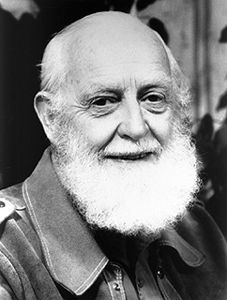Barry Callaghan, writer, poet, painter, man of letters (born 5 July 1937 in Toronto, ON). Son of writer Morley Callaghan and Loretto Dee, Barry Callaghan holds a BA and MA from the University of Toronto (1960, 1963) and was awarded a D.Litt from the State University of New York in 1999. Callaghan's writing is wide ranging but often takes the perspective of a marginal individual's view of the human experience. His work in fiction, non-fiction and documentary film, and his mentoring of new authors, reveals a dedication to the Canadian intellect and imagination.
Hogg Poems and Drawings (1978) is Barry Callaghan's first collection of poetry. The protagonist, on a quest to escape the strictures of Hog Town (Toronto), finds experiences that are frequently absurd, both new and resonating with history. Callaghan's complex rhymes are felt again in his collection The Seven Last Words (2001), which describes the aloneness and isolation of being a victim of the "thought police," those who regard the non-conformist as criminal. Callaghan's poem sequence in memory of his mother, Stone Blind Love (1987), articulates deep devotion but never slides into sentimentality.
Indicative of his mastery of the short story form (see Short Fiction in English), Callaghan's The Black Queen Stories (1982) are urbane tales about the underbelly of a big city, in which Callaghan reveals his ear for piercing dialogue and sophisticated symbolism. Never's Just the Echo of Forever, a novella of great power, closes the collection A Kiss Is Still A Kiss (1997). The poignancy of the central character's epiphany is imbued with the relief of self-discovery: "He was just weeping. Overwhelmed by sorrow, thinking of the cops, how pathetic they were, the way they saw nothing and would never hear fiddle music in the trees... then, an enormous sense of relief took hold." The collection Between the Trains, Stories (2007) offers an array of characters who speak deep truths stated in simple vernacular. In "A One Night Stand," a couple's breakfast banter on the morning after is real and heartfelt, capturing a moment of revelation one character desperately needed to speak: "You don't know nothing about me... when I sing about all the ghosts I got in me, I am Lazarus...I am ... the resurrection of the dead."
An attention to voice and locale are strongly demonstrated in Callaghan's work Barrelhouse Kings (1992), a fictional memoir about his father. Callaghan's collections of essays, Raise you Five (2005) and Raise You Ten (2006), trace with a raw energy and a deep intellect the changing nature of Canada, Canadian culture and their political context.
Barry Callaghan's novels are critically acclaimed as intelligent works with authentic characters moving in fully realized worlds, often gritty, always eloquent. His first novel, The Way The Angel Spreads Her Wings (1989), was revisited by Callaghan in 2009, titled Beside Still Waters.
The work portrays Adam Waters' international search for the woman he loves as it moves between the past and Adam's present, featuring his jazz-playing father and his first love, Gabrielle. After making love to Gabrielle on Christmas Eve, "he worried about her saying that they had sinned...he felt closer to God or at least close to the lightness that he thought must be the lightness of the grace." In another novel, When Things Get Worst (1993), Callaghan presents a portrait of a woman who clings to the strength her farm gives her regardless of her neighbours' scorn and abandonment. With black humour and strident language, Callaghan gives his protagonist a strong voice and an unforgettable presence.
In 1972, the year he began teaching at York University, Callaghan founded Exile: A Literary Quarterly, now ELQ Magazine, allowing him to publish some of the freshest voices from around the world. This venture has expanded to Exile Editions, a small, distinguished publisher of literary writing and translations, many done by Callaghan, such as the poetry of Robert Marteau and Miodrag Pavlovic.
Barry Callaghan has also worked in film and the visual arts, making over 20 short films and documentaries about the Middle-East conflict, South Africa and Ireland. He has contributed to arts programming at the CBC, both in radio and television. His writing continues to be widely anthologized in major Canadian collections and internationally. Callaghan is the recipient of National Magazine awards, the W.O. Mitchell Award for Fiction (1998), and a Toronto Arts Award (2000), in addition to honourary degrees from several universities.
Retired from teaching, Barry Callaghan continues to edit and write. He lives in Toronto.

 Share on Facebook
Share on Facebook Share on X
Share on X Share by Email
Share by Email Share on Google Classroom
Share on Google Classroom

